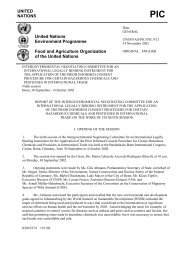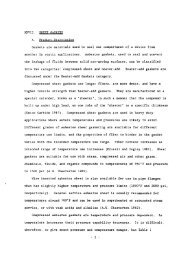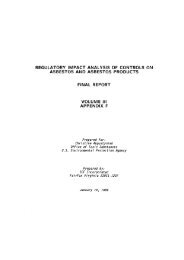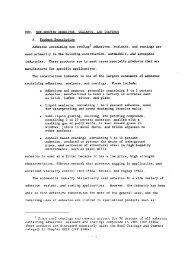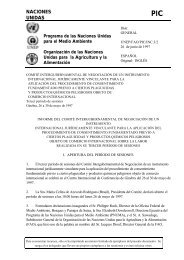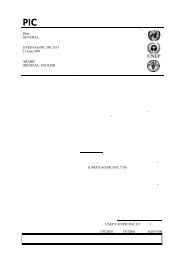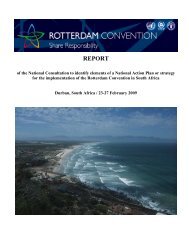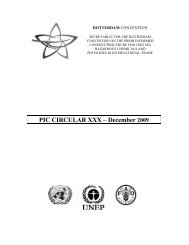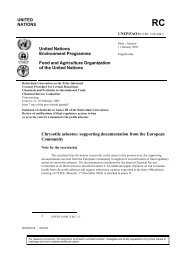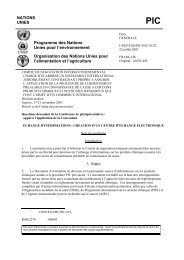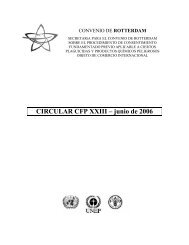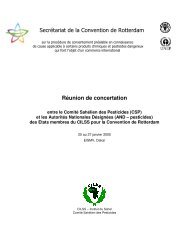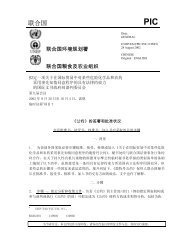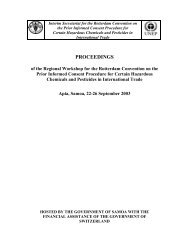Environmental Health Criteria 214
Environmental Health Criteria 214
Environmental Health Criteria 214
Create successful ePaper yourself
Turn your PDF publications into a flip-book with our unique Google optimized e-Paper software.
HUMAN EXPOSURE ASSESSMENT<br />
Organizations and all the Participating Institutions before embarking<br />
on the preparation of the monograph.<br />
Procedures<br />
The order of procedures that result in the publication of an EHC<br />
monograph is shown in the flow chart. A designated staff member of<br />
IPCS, responsible for the scientific quality of the document, serves<br />
as Responsible Officer (RO). The IPCS Editor is responsible for<br />
layout and language. The first draft, prepared by consultants or,<br />
more usually, staff from an IPCS Participating Institution, is based<br />
initially on data provided from the International Register of<br />
Potentially Toxic Chemicals, and reference data bases such as Medline<br />
and Toxline.<br />
The draft document, when received by the RO, may require an<br />
initial review by a small panel of experts to determine its scientific<br />
quality and objectivity. Once the RO finds the document acceptable as<br />
a first draft, it is distributed, in its unedited form, to well over<br />
150 EHC contact points throughout the world who are asked to comment<br />
on its completeness and accuracy and, where necessary, provide<br />
additional material. The contact points, usually designated by<br />
governments, may be Participating Institutions, IPCS Focal Points, or<br />
individual scientists known for their particular expertise. Generally<br />
some four months are allowed before the comments are considered by the<br />
RO and author(s). A second draft incorporating comments received and<br />
approved by the Director, IPCS, is then distributed to Task Group<br />
members, who carry out the peer review, at least six weeks before<br />
their meeting.<br />
The Task Group members serve as individual scientists, not as<br />
representatives of any organization, government or industry. Their<br />
function is to evaluate the accuracy, significance and relevance of<br />
the information in the document and to assess the health and<br />
environmental risks from exposure to the chemical. A summary and<br />
recommendations for further research and improved safety aspects are<br />
also required. The composition of the Task Group is dictated by the<br />
range of expertise required for the subject of the meeting and by the<br />
need for a balanced geographical distribution.<br />
The three cooperating organizations of the IPCS recognize the<br />
important role played by nongovernmental organizations.<br />
Representatives from relevant national and international associations<br />
may be invited to join the Task Group as observers. While observers<br />
may provide a valuable contribution to the process, they can only<br />
speak at the invitation of the Chairperson. Observers do not<br />
participate in the final evaluation of the chemical; this is the sole<br />
responsibility of the Task Group members. When the Task Group<br />
considers it to be appropriate, it may meet in camera.<br />
All individuals who as authors, consultants or advisers<br />
participate in the preparation of the EHC monograph must, in addition<br />
to serving in their personal capacity as scientists, inform the RO if<br />
at any time a conflict of interest, whether actual or potential, could<br />
be perceived in their work. They are required to sign a conflict of<br />
interest statement. Such a procedure ensures the transparency and<br />
probity of the process.<br />
When the Task Group has completed its review and the RO is<br />
http://www.inchem.org/documents/ehc/ehc/ehc<strong>214</strong>.htm<br />
Page 11 of 284<br />
6/1/2007



